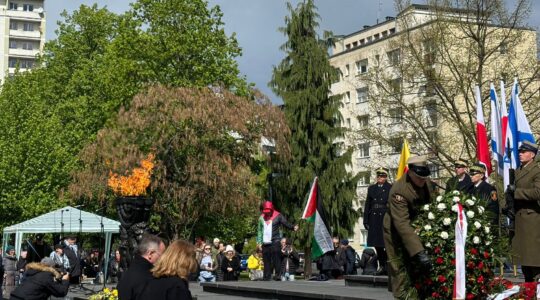LONDON (JTA) — European Jewish leaders are committed to interfaith dialogue — but how should they proceed if there appear to be no moderate Muslim leaders in their communities to talk with?That was one of the key issues discussed by Europe’s senior rabbis at a Feb. 5-6 conference in London.”Those of us who were at Seville for the rabbis-imams conference questioned the effectiveness of sharing any sort of platform with radical Muslims,” Philip Carmel, international relations director of the Conference of European Rabbis, or CER, told JTA. He was referring to a March 2006 meeting in Spain. “Our job is to remain firm in meeting only with Muslim leaders who both recognize our existence and our right to self-determination, and who unequivocally reject violence,” he said.The London conference, “The Role of the Rabbi in a Multi-Cultural Europe: Strategies for Dialogue,” brought together more than 30 of Europe’s senior rabbis to discuss how the continent’s Jewish communities relate to general society, multiculturalism and the growth of other minority cultures. Among those attending the meeting, co-sponsored by CER and the British Chief Rabbi’s Office, were the chief rabbis of Austria, Ukraine, Poland, Geneva, Basel, Moscow, Munich, Brussels, Strasbourg, Amsterdam, Copenhagen and the United Kingdom. In discussions about anti-Semitism, the rabbis talked about the necessity of mobilizing non-Jewish opinion against anti-Semitism, which they argued would be more effective than making it solely a Jewish issue. Similarly, they decided they should be equally supportive of other groups that face discrimination in order to assert basic anti-discrimination principles, and also to draw wider support when Jews are threatened. “It’s very clear that we should cooperate with other faith groups on areas of common interest, such as faith schools and the general secularization of Western society,” Carmel said. “With regard to interfaith dialogue, the prerequisite is respect for the other as a human being. The rabbis were very clear we are not talking here about theological tit-for-tats but that people who advocate nonviolent and peaceful solutions to problems of society should share views.” Sessions on interfaith relations used Britain as a multicultural model. Shimon Cohen, head of a London-based public relations firm called The PR Office, talked about how relationships with governments have changed and stressed the importance of grassroots ties, or “bottom-up lobbying.” He used several examples — such as kosher slaughter and faith schools — to show how the Jewish community could use gentle suasion to accomplish its goals. “It’s important that leading European rabbis understand their relationship on how they deal with governments and the importance of interfaith relationships as they have more influence together,” Cohen said.Bent Dov Lexner, chief rabbi of Copenhagen, spoke about the Jewish reaction to last year’s Danish cartoon controversy that sparked unrest in the Muslim world. “The Jewish view was that the newspaper should have acted with greater sensitivity, although we are in no doubt that the violent action was condemnable and out of proportion even if we understand the offense caused,” Lexner said.The conference also heard from Rabbi Refael Evers of Amsterdam on attempts by Muslim fundamentalists in Holland to restrict freedom of expression following the 2004 murder of Theo Van Gogh, a Dutch film producer slaughtered by a Muslim fundamentalist on a city street. The conference closed with a panel discussion with Michael Weninger, senior adviser on religious affairs to the European Commission, on “A Europe of Diversity: Can dialogue between faith groups create a better society?” “The seminar provided a unique opportunity for those senior rabbis in Europe who are actively involved on a day-to-day basis with how Jewish communities interact as a minority faith within non-Jewish societies to share ideas and best practices in this field,.” said Rabbi Aba Dunner, the CER’s executive director. “Jews in Europe have been a model of integration into European societies and, perversely, today they’re now at threat as a result of other cultures’ inability to succeed in their own integration,” he said. “Our rabbis have a duty as leaders of their communities to be open to developments within their wider societies and to seek ways to make life in Europe more comfortable for Jews at a time when many of their congregants are increasingly asking the question whether we have a future here as Jews.” The attendees agreed to create a permanent cadre of senior rabbis in Europe to respond regularly on key issues of European society within the context of the CER. The CER federates Jewish religious leaders in more than 40 European countries and includes all of the continent’s chief rabbis and senior religious judges. The group holds NGO consultancy status at the Council of Europe and within European Union institutions. □





